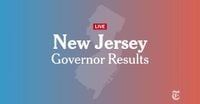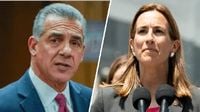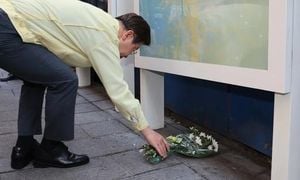On Tuesday, June 10, 2025, New Jersey voters turned out for a historic primary election that set the stage for a fiercely contested gubernatorial race and significant local contests. The primaries were notable not only for their competitive fields but also for being the first partisan elections in the state without party line ballots, a change designed to give all candidates a fair shot. This election also featured record-breaking campaign spending, underscoring the high stakes involved as the Garden State prepares for a new governor to succeed term-limited Democrat Phil Murphy.
The New Jersey primary, conducted as a closed primary, allowed only registered Democrats and Republicans to cast ballots for their party’s candidates. In a move to respect religious observances, Governor Murphy had signed legislation in December 2024 moving the primary date from June 3 to June 10 to avoid conflict with the Jewish holiday of Shavuot, observed from June 1 to 3. This adjustment was part of an effort to ensure voter participation was not hindered by cultural observances.
The spotlight was firmly on the governor’s race, which drew the most crowded field in decades. With Murphy unable to run due to term limits, six Democrats vied for the nomination, including two big-city mayors, two members of Congress, and two union leaders. On the Republican side, five candidates sought the nomination, with former gubernatorial candidate Jack Ciattarelli, endorsed by former President Donald Trump, emerging as the clear favorite.
When the polls closed at 8 p.m., early returns quickly indicated decisive victories. The Associated Press called the Republican primary for Jack Ciattarelli shortly after polls closed, even with only 17% of GOP votes counted. Ciattarelli, making his third run for governor, celebrated a sweep of all 21 New Jersey counties, emphasizing his campaign’s focus on people and vision over politics and division. He pledged to reach out to communities of color, unaffiliated voters, and frustrated Democrats, promising a campaign marked by "all gas, no breaks." His platform included ending protections for immigrants, halting suburban sprawl, overhauling the public school curriculum, and reducing state government size. "It’s time for a Jersey guy who understands what people are up against every day," Ciattarelli declared, positioning himself as a "common-sense problem solver" and "hands-on CEO" for the state.
Meanwhile, the Democratic primary was called for U.S. Representative Mikie Sherrill at 8:39 p.m., with 32% of Democratic votes counted. Sherrill secured 34.0% of the vote, defeating Newark Mayor Ras Baraka, Jersey City Mayor Steve Fulop, U.S. Representative Josh Gottheimer, teachers’ union-backed Sean Spiller, and former state Senate president Steve Sweeney. Sherrill’s victory was seen as a win for a moderate, party-supported candidate who campaigned on affordability, abortion rights, and community protection.
In her victory speech, Sherrill invoked New Jersey’s revolutionary history, saying, "In New Jersey we know how to make history," referencing George Washington’s crossing of the Delaware River. She framed the current political moment as a crisis for the state’s future, promising to "fight for affordability," protect children online, and uphold abortion rights. She sharply criticized Ciattarelli, accusing him of raising taxes as a local and state politician and pledging to implement an abortion ban and defund Planned Parenthood. "A state like this is not going to be led by a Trump lackey like Jack Ciattarelli," she said. "I am ready to shake up the status quo. And Jack is the status quo. He’s a ghost of elections past. If Jack Ciattarelli is the ghost of elections past, then tonight we write the future."
Other Democratic candidates responded with calls for party unity and reflection. Ras Baraka, who finished second with 20.4% of the vote, urged the party to embrace progressive priorities and include marginalized voters. He emphasized the need to prevent a Republican victory in November and called for discussions about the party’s direction, especially regarding working-class families. Sean Spiller, despite a well-funded campaign backed by the New Jersey Education Association, conceded the race, acknowledging the challenges of confronting "machine politics" and special interests but highlighting the importance of raising educators’ issues.
Steve Fulop and Josh Gottheimer also reflected on the campaign’s messages and future efforts. Fulop, who garnered 15.9% of the vote, expressed confidence in his campaign’s intentions and stressed the importance of electing a Democrat in November. Gottheimer emphasized the need for a "commonsense approach" and highlighted his campaign’s efforts to think outside traditional Democratic norms while taking on former President Trump.
The primary also featured a competitive Atlantic City mayoral race. Incumbent Marty Small won the Democratic primary against challenger Bob McDevitt, while Republican Ahmed Khan ran unopposed. These local contests, alongside the gubernatorial race, underscored the broad voter engagement this year, which was higher than typical for nonfederal election years. Early voting saw nearly 12% of registered Democrats and Republicans cast ballots, with the total turnout potentially surpassing the record 786,000 votes cast in a gubernatorial primary this century.
The election also marked the debut of a redesigned ballot format that eliminated the traditional county line, which previously influenced voter behavior. Instead, county party endorsements appeared under candidates’ names, and offices were arranged in blocks by office rather than party. This change aimed to level the playing field and encourage voters to consider candidates more independently. Assembly primaries were unusually competitive, with 23 Democratic and six Republican districts contested, particularly in Hudson and Bergen counties. Assembly candidates raised over $26 million, with incumbents dominating fundraising and spending.
Financially, the 2025 New Jersey governor’s race was unprecedented. Under a 2023 campaign finance law, candidate campaigns and independent groups spent over $151 million since 2022. Major-party candidates themselves spent nearly $55 million, including $37 million in public matching funds. Independent committees, which are legally barred from coordinating with candidates, spent another $96 million. Notably, the New Jersey Education Association contributed $46 million to independent groups backing Sean Spiller, highlighting the significant role of outside spending in this election cycle.
On the Republican side, besides Ciattarelli, state Senator Jon Bramnick represented the moderate wing, while former talk radio host Bill Spadea positioned himself as the most MAGA-aligned candidate. Spadea, despite losing, vowed to continue advocating for conservative issues such as gun rights and opposition to transgender policies, accusing the party establishment of sidelining his campaign and criticizing Ciattarelli’s Trump endorsement.
As New Jersey prepares for the November general election, the primary results have set the stage for a high-stakes battle between Sherrill and Ciattarelli. Both candidates have laid out contrasting visions for the state’s future, touching on key voter concerns such as affordability, education, immigration, and social issues. With New Jersey at a political crossroads, the coming months will test which vision resonates most with the Garden State’s diverse electorate.





